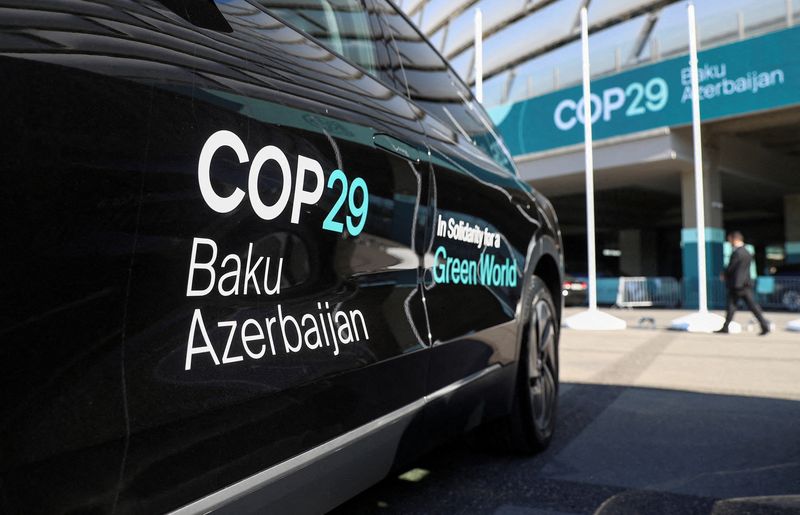Analysis-Trade demands clash with climate agenda at COP29 talks
2024.11.21 10:15
By Kate Abnett
BAKU (Reuters) – Trade tensions are flaring at the COP29 climate summit, with China, Brazil and a host of developing countries complaining that perceived trade barriers, such as the European Union’s carbon border levy, will undermine climate efforts, according to U.N. documents and negotiators.
Nearly 200 countries are wrangling at the climate talks over a deal to provide hundreds of billions of dollars annually to help poorer countries cope with climate change.
But the countries that would get the money say their ability to invest in the green transition is being undermined by costly new climate-related trade policies imposed by the world’s wealthiest economies. Some developing nations want these policies scrapped.
These countries are already facing growing climate costs, plus a possible spike in the price of doing business abroad if President-elect Donald Trump imposes tariffs on U.S. imports.
In a statement seen by Reuters, those concerns – first raised by China ahead of the COP29 summit – are being pushed by the so-called G77 and China group of 134 countries, which includes Brazil and South Africa, along with nearly every developing country in the world.
The previously unreported statement, delivered by the group in closed-door talks at COP29, described trade-related climate policies, such as the European Union’s carbon border tariff, as punitive and an “unsavoury attempt to try to continue to subject our developing countries to underdevelopment”.
“The use of a hard stick hitting on our heads and hands is not a solution to climate change,” the statement said.
Another U.N. document, published on Thursday, showed that diplomats at COP29 are debating putting trade policy concerns on the agenda of a U.N. committee for the next five years. This would effectively create a permanent space for talks on trade tensions at the world’s climate negotiations.
Previous attempts to raise climate-linked trade concerns had been blocked at both the U.N. climate talks and the World Trade Organization.
“It’s high time we dealt with them,” said Uganda’s Adonia Ayebare, who chairs the G77 and China group, referring to unilateral trade policies like carbon border tariffs. “We want them cancelled.”
Developing countries have reason to think they may succeed with their challenge.
After pushback by Brazil, the United States and other trading partners, the European Union last month proposed to delay its law banning soy and beef imports linked to deforestation by a year, until end-2025.
“I think they heard us,” Brazil’s climate secretary Ana Toni told Reuters. “They delayed, and hopefully we’ll now go into the detailed conversations” about the deforestation law’s impact on concerned countries.
A draft early on Thursday of the COP29 summit’s central deal on climate finance did mention trade issues, but was quickly rebuffed by the EU as outside of the scope of the talks.
STRATEGY RISKS
The diplomatic skirmish over trade has exposed an awkward mismatch between global trade practice and the world’s climate agenda.
Pascal Lamy, former head of the WTO, told Reuters the clash was inevitable, as the global consensus around trade rules that apply to all countries runs up against the U.N. Paris climate accord’s requirement that governments rapidly enact individual CO2-cutting polices.
The EU, which has some of the world’s most ambitious goals to tackle climate change, has moved faster than others to translate those goals into policies.
From 2026, the EU’s carbon border levy will charge steel, cement and other imports for their CO2 emissions, subjecting them to the same carbon price paid by European industries.
Brussels insists the levy is not a trade measure, but a tool to ensure a level playing field and keep European companies from dodging EU pollution cost by moving overseas.
“It’s a measure to prevent the European Union from making somebody else’s emissions problem bigger than it is already,” Austrian climate minister Leonore Gewessler told Reuters.
European industries – many reeling from high costs and cheaper imports – have largely supported the carbon border levy.
But such arguments have not allayed concerns among countries bracing for an economic hit. Research last year by the London School of Economics suggested the carbon border levy could shave 0.91% from the African continent’s economy.
Policies such as taxing carbon at the border can encourage emissions cuts worldwide, but businesses warn that, unless carefully designed, they risk excluding from markets companies that struggle to comply.
“We see a risk of fragmenting the global trading system, certainly knocking SMEs (small businesses) potentially out of global supply chains,” said Andrew Wilson, deputy secretary general at the International Chamber of Commerce.
MORE TARIFFS
Developing countries are not alone in worrying about trade barriers blocking climate progress.
The world’s wealthiest countries – including the United States – could see disruptions to their energy transition if Trump pursues tariffs that would hit green energy supply chains for raw materials and components that largely come from China.
Trump campaigned on a promise to impose 60% tariffs on Chinese imports and lower tariffs on all others. U.S. businesses have said such policies could hold up the U.S. deployment of green technology and put its climate targets at risk.
“It will slow down deployment of solar and clean energy,” by making green energy options more expensive, Abby Hopper, CEO of the Solar Energy Industries Association, said.

Pedro Pizarro, CEO of U.S. utility Edison International (NYSE:), said U.S. companies could also pass tariff costs on to consumers for imported parts needed to expand electricity grids and other infrastructure, which are no longer made domestically.
“You cannot find a high voltage transformer in the U.S. Most of the batteries come from China,” he said. “Ultimately, end-use customers may end up bearing the brunt of the tariffs.”








